- Home
- Richard F. Weyand
Galactic Mail: Revolution! (Childers Universe Book 3) Page 3
Galactic Mail: Revolution! (Childers Universe Book 3) Read online
Page 3
And Costa couldn't change that. Yet.
“One more Board election and we should have it, Padma. Of the eight Board members retiring next election, six of them are against me on this. If we get even three more Board members that agree with me, we could do something about this crap.”
“So we need five total of the eight incoming?”
“Yeah, that would do it, with a spare or two. I already have five of the other eight. But I can't get out on a limb on this. If I were to act now, and lose a Board motion on a nine-to-seven vote – which is what it would be, let me assure you – then I'm out. And our chance to reinterpret Galactic Mail's charter to keep this sort of thing from happening into the future goes right out the window.”
“And if you were removed instead, that would set back progress substantially.”
“Absolutely. I'm three years into my second term, and I'm pretty popular with the Board and the employees. And we've been gradually winning the Board over to our point of view over the last ten or twelve years. But I still don't have a majority. If I were to be removed by the Board for acting on this –” he waved the printout in his hand “– it would tell every CEO of Galactic Mail for the next fifty years they shouldn't go down this path, and the tyrants and dictators would breathe easy. We might lose our chance to stop this terror forever.
“Look, the next Board meeting is in two years. What we need to do is work up some solid candidates for the Board who share our thinking. Half the planets don't even send delegates to the shareholders meetings anymore. If we can get some proxies, and subtly push some candidates over others, we should be able to get the three more votes we need.”
“OK, OK. It just galls the hell out of me these bastards pull this crap, and we have all this technology and military power, and we don't do anything about it.”
“Oh, I understand, Padma. Trust me, I understand. And I agree with you. But we need to take this a step at a time to get it done. In the meantime, things are going to have to go on as they are a while longer. Let's get working on identifying some solid Board candidates for that next election. It's not too soon to start.
“The other thing we can do is start a little list. Let's put the Grand Duke of Wallachia at the top of it.”
“We have a little over ten thousand proxies out of a hundred and five thousand or so shares,” Kosar said.
“Excellent, Padma,” Costa said. “Excellent. And with fifty thousand or so attending, an additional ten thousand votes we can cast for our candidates is a big help. We should be able to get the five candidates we need. At least. And how's our list coming?”
“Our top tier, our Most Not Wanted list, is twenty planets.”
“Soon, then. We will likely be able to act on them soon.”
The Galactic Mail shareholders meeting was held in an arena built for the purpose in a natural bowl in the hills between Galactic Mail's headquarters site and the city of Nadezhda on Doma. The arena was used for other purposes by both Galactic Mail and Nadezhda, and had rail service from both the Galactic Mail headquarters and the Nadezhda municipal transit systems.
With fifty thousand shareholders attending, three from each of the planets who had sent delegates, the process for nominating members of the Board of Directors was largely held in advance of the meeting, via mail. Last minute nominations were admitted at the shareholders meeting, and the short speeches by all the candidates lasted a total of three days.
In the end, the ten thousand proxies proved decisive. The candidates whom management supported took six of the eight open seats on the Board.
After fifteen years as CEO of Galactic Mail, Sylvain Costa finally had the majority he wanted.
Decision and Action
“I don't like this plan,” said John Meisner, a Board member of Galactic Mail, to the rest of the Board. “I think it deviates too strongly from what has been for one hundred and seventy-five years a working strategy. I've circulated around to you all some of the published discussion that occurred among the founders of Galactic Mail. It is clear their greatest worry was that Galactic Mail would morph into a galactic central government. I think this is too much of a step in that direction, and I recommend against it.”
“Galactic Mail is not a central government, John, and this change will not make it one,” Koit Strnad said.
“Military action in response to events internal to a system? How is that not the sort of action a central government takes? It presumes the authority to judge a planetary government's actions, and thereby makes Galactic Mail superior to the planetary government,” Meisner said.
“Galactic Mail has always been there to defend planets against space-based attack. This is a minor change, in which Galactic Mail will prevent the planet from a space-based attack by its own government. I really don't see what the big problem is,” said Humaira Zhao.
“That's a bit of a sleight of hand, Humaira,” Donal Suzuki said. “The mission of Galactic Mail has always been to protect systems from space-based attack by other systems. Interplanetary attack. Not internal matters within a star system.”
Zhao waved her hand. “As I say, a slight change. I have no problem with it. I do have a problem with the sort of thing we see going on, in which governments bombard their own people. That is what I am opposed to. I am surprised you are not.”
The excitable Suzuki was about to jump out of his seat, but a hand on his arm from Meisner restrained him.
“Of course, we're opposed to the orbital bombardment of people by their own government,” Meisner said. “The question before us today is whether it is Galactic Mail's responsibility to prevent or punish it. As I've said before, there is a danger there. One that our founders saw clearly. It is too bad we have lost that clarity of vision in the one hundred and seventy-five years since.”
Zhao took a breath to continue the volley, but Strnad cut her off.
“Further discussion will get us nowhere. I call the vote.”
“Very well,” Chairman of the Board Maxwell Guerrero said. “By show of hands. All in favor? All opposed? Let the record show the Ayes have it, by a vote of eleven to five.
“May God have mercy on us all,” Suzuki said.
“OK, so the Board passed the resolution. Do we get to hammer these guys now?” Kosar asked.
“No, Padma. What we do is hit them if they do it again, on a going forward basis,” Costa said.
“So they get away with what they did?”
“I didn't say that. We wait. If they do it again, then we check whether it's the first time or not. Whether they're on our list or not.”
“And if it's not their first time?”
“Then we hit them hard.”
Word of Galactic Mail's new policy went out to all human planets. Most people who paid any attention to it at all regarded it as a good thing. Some thought it was well past due. A few planetary governments, not by any means tyrannies, had grave misgivings, but they were in the minority.
The word also got out to the resistance movements on various planets. Knowing Galactic Mail would intervene in the case of kinetic bombardment emboldened them to act now, before Galactic Mail changed its mind.
Over the next three months, revolutionary movements stepped up their attacks on their local governments on hundreds of planets. In twenty-three of these, the hard-pressed governments responded with kinetic attacks from space.
Galactic Mail responded.
Two hunting parties of beam weapon drones and a nuclear weapon drone dropped out of hyperspace in the Algused system. They accelerated toward the planet. As the drones swept past the planet, the hunter/killers targeted all the police enforcement ships in space. The single nuclear weapon drone targeted the large space station the police maintained to service their orbital ships, and its ten megaton warhead vaporized the station.
Their job done, the drones returned to Doma.
“Well, we're making a difference now, at least. These little tin-pot dictators know they can't bombard their own citizens with imp
unity,” Kosar said.
“How many is that now?” Costa asked.
“Twenty-three.”
“And we've limited our strikes to space-based police infrastructure?”
“Yes, sir. Although I think that's a mistake.”
“I know you do, Padma. But for a first-time offender, that's as far as I'm willing to go right now.”
Costa's terminal sounded a priority warning. He turned to it, and his eyebrows went up as he read.
“Another kinetic strike?” Kosar asked.
“Yes. On Wallachia.”
“Yes! We're finally going to get that bastard. I've been hoping for this.”
Costa found Kosar's glee at this development more than a little disturbing.
“You sound happy he bombarded his own planet.”
“Not at all. But I am happy that, at least in this case, we get to take the gloves off. Orders, sir?”
Costa sighed. The moment of decision had arrived.
“Attack Plan Alpha.”
Twenty-seven drones dropped out of hyperspace in the Wallachia system and accelerated towards the planet. As the drones swept past the planet, the hunter/killers targeted all the police enforcement ships in space. A nuclear weapon drone targeted the large space station the police maintained to service their orbital ships, and its ten megaton warhead vaporized the station.
Additionally, kinetic strike drones hit the Grand Duke's palace and his summer home, the House of Lords, and the headquarters of the security services in the capital. Two nuclear weapons hit the two large police bases, one on each major continent, which were located away from the cities to protect them from their own citizenry.
Having wiped out the police forces and decapitated the regime, the drones returned to Doma.
Hesitation and Resolve
“Did you see the announcement by Galactic Mail about the ban on kinetic orbital strikes?” Enfield asked.
“Yes. I saw that, then requested the private minutes of the Board meeting where they passed a resolution 'reinterpreting' the charter. I put those minutes in the distribution to the Watchers.”
“Ah. So that was you.”
They were walking in the woods above Campbell Hall, where they couldn't be overheard or monitored.
“Yes, it was me,” Dawson said. “I also went back and looked at the vote tallies of the shareholders meeting. Only half the shareholders attended, and management voted ten thousand proxies.”
“Ouch. That's a hole in the structure Jan Childers didn't see.”
“I don't think it ever occurred to her a planet wouldn't bother sending delegates to the shareholders meeting. Or that management would solicit proxies.”
“That was a failure of imagination. Voter participation in democracies falls when people are happy. They get complacent. Well documented in Earth history,” Enfield said.
“And now the Board has voted to abandon the charter. Or rather, 'reinterpret' the charter.”
“Same difference. What it means is Galactic Mail is officially off the rails. So do we vote to take it over now?”
“I don't think so,” Dawson said. “When and if we take it over, there is going to be a lot of breakage. People dead, stuff blown up, our existence revealed. It's going to be a messy process. We only have one shot at this.”
“You don't think it's time yet, then?”
“Not yet.”
“So I guess we get to wait and see where this goes,” Enfield said.
“Yeah. But you're right. I sure don't like the look of where it's headed.”
Another day, another walk in the woods.
“How many is that now?” Enfield asked.
“How many what?” Dawson asked.
“How many systems where Galactic Mail acted outside what it's charter was always understood to allow?”
“Twenty-one systems.”
“So far,” Enfield said.
“Yeah. Twenty-one so far. But in none of these has Galactic Mail hit anything other than space-based resources of the system police forces. No planet hits, no civilian damage. They just hit the regime security forces, and only in space.”
“So you don't think it's time yet.”
“No. Not yet. Maybe this is as far as they'll go,” Dawson said.
“All right. I'll go along with you. But I don't think they're going to stop here.”
“I don't either, but I hope they do.”
Several weeks later, Dawson was much more somber during their walk.
“Galactic Mail hit Wallachia. Decapitated the regime, multiple planetary hits, nuclear weapons on the planet's surface. The whole nine yards,” Dawson said.
“Yeah, they bombarded the planet to punish the regime for bombarding the planet. You have to appreciate the irony there,” Enfield said.
“No, I don't. I don't appreciate it at all. It means I have to set aside the life I've lived, the things I love, and go off to war because they're too damned stupid to leave a good thing well enough alone.”
“So it's time?”
“Yes, it's time. And I already made sure all the news clippings and Galactic Mail press releases were still in the distribution list. We'll see if a majority agrees. But I'm going to vote to take over Galactic Mail,” Dawson said.
“Well, I'm with you, Pat. I'm going to send my vote in as well. And, whatever happens, I'll be there with you.”
“I appreciate it, George. I really do.”
Back at home, Dawson stared at the words on her screen. Jan Childers must have been psychic. Vision alone couldn't account for it, for how clearly she had seen the stark choices, the terrible burden, that would face her descendants. How well those words encapsulated Dawson's current position. It was her right. It was her duty.
Whatever else happened, her life would never be the same.
She read them again, sighed, and hit Send.
“... it is their right, it is their duty, to throw off such Government, and to provide new Guards for their future security.”
Notification
Two days later, Dawson received by mail the official notification the Watchers had voted in the majority to overturn the management of Galactic Mail and take over the corporation. A Galactic Mail ship would be arriving to take them on board in about two weeks.
That night, with the kids in bed, they were sitting at the kitchen table.
“You know how I said the odds were against this confidential project becoming dangerous?” Dawson asked.
“Yes,” Morgan said.
“Well, it just became dangerous.”
Dawson told him the whole story: her recruitment by her great grandmother, Grandma Lieber; the line of Watchers, keeping tabs on Galactic Mail, guarding against its transition to a galactic government; her intuition that George Enfield was the other Childers Watcher, and confirming it that day at the gym; her training efforts, both separately and together with Enfield; their sending their vote that Galactic Mail had gone off the rails; and the notice she had just received that a majority of the Watchers agreed.
“That's an amazing story. This introduction by Jan Childers. Can I VR that?”
“Sure.”
Dawson didn't keep any materials related to her role as a Watcher on her system. She handed him the memory chip and he went back into his home office to view it. He was a while returning.
“Sorry about that. I checked out the language in the incorporation papers while I was there. They had some pretty good lawyers draw up those documents. The authority for the Watchers is in there, but it doesn't jump out at you,” Morgan said.
“I looked for it and didn't find it.”
“'The Board may be removed at any time by a one-quarter vote of the shareholders, or by a majority vote of such other group as may be established by the Board, and a new Board elected by the shareholders or by such other group.' Welcome to 'such other group.'“
“Ah, that's it. The Board must have passed a measure to establish the Watchers at some point, and it's buried in mounta
ins of Board measures passed over the decades since,” Dawson said.
“Yep. So the authority is there, built into the initial incorporation papers, in the non-amendable portion of Galactic Mail's charter.”
“So Jan Childers saw the need for such a group before Galactic Mail was even founded.”
“She had to have. It was in the initial filing,” Morgan said.
“Amazing.”
“I'll say. And that introduction by her was remarkable.”
“In what way?” Dawson asked.
“In a whole bunch of ways. Mostly her vision. That she could see all this coming. That she could plan against it, almost two centuries in advance. Ninety-some years old, sitting in a rocking chair sipping her tea, on a colony planet, looking out over the sleepy little town New Hope was at that time, and planning and steering the future of the galaxy hundreds of years in advance. And her personal power. The VR fairly vibrated with her authority. Remarkable.” Morgan looked up at Dawson, scanned her face. “You look a lot like her, you know.”
“I noticed that. But I'm descended from her along three different lines. It was a small colony, after all, and I'm eight generations removed from her. But it looks like some of those crossbreeds reinforced,” Dawson said.
“I suspect you're right, because your resemblance to her is clear, other than your height.”
“But that wasn't genetic with her. That was malnourishment during her growth years. I wonder how tall she would have been if not for that.”
“No way of knowing.”
Dawson and Enfield met once more in the woods at their favorite hunting blind, in the hills above Campbell Hall.

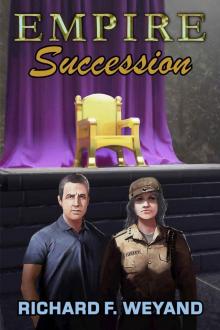 EMPIRE: Succession
EMPIRE: Succession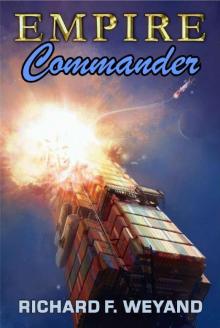 Commander
Commander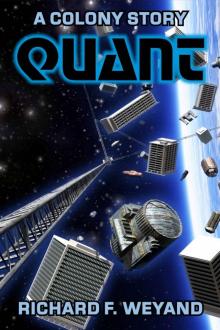 QUANT (COLONY Book 1)
QUANT (COLONY Book 1) EMPIRE: Renewal
EMPIRE: Renewal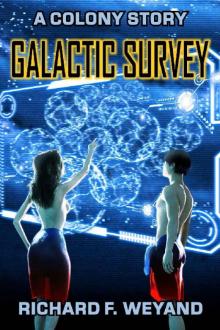 GALACTIC SURVEY (COLONY Book 3)
GALACTIC SURVEY (COLONY Book 3) Campbell- The Problem With Bliss
Campbell- The Problem With Bliss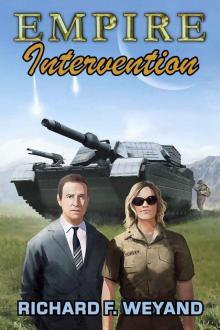 EMPIRE: Intervention (EMPIRE SERIES Book 13)
EMPIRE: Intervention (EMPIRE SERIES Book 13)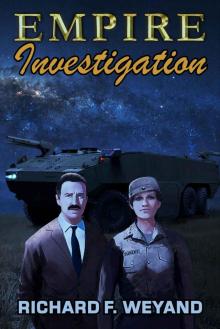 EMPIRE: Investigation
EMPIRE: Investigation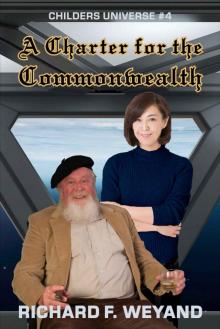 A Charter for the Commonwealth
A Charter for the Commonwealth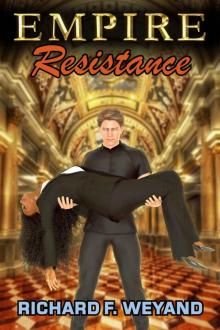 EMPIRE: Resistance
EMPIRE: Resistance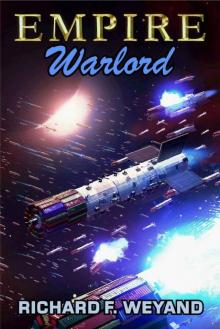 EMPIRE: Warlord (EMPIRE SERIES Book 5)
EMPIRE: Warlord (EMPIRE SERIES Book 5)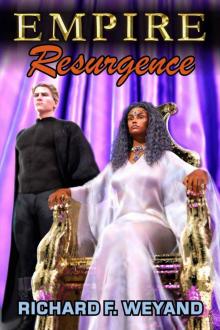 EMPIRE: Resurgence
EMPIRE: Resurgence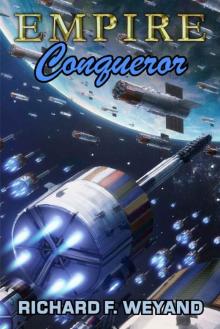 EMPIRE: Conqueror (EMPIRE SERIES Book 6)
EMPIRE: Conqueror (EMPIRE SERIES Book 6)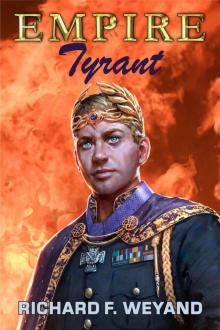 Tyrant
Tyrant Usurper
Usurper Galactic Mail: Revolution! (Childers Universe Book 3)
Galactic Mail: Revolution! (Childers Universe Book 3) Galactic Mail_Revolution!
Galactic Mail_Revolution! Childers
Childers CHILDERS_Absurd Proposals
CHILDERS_Absurd Proposals